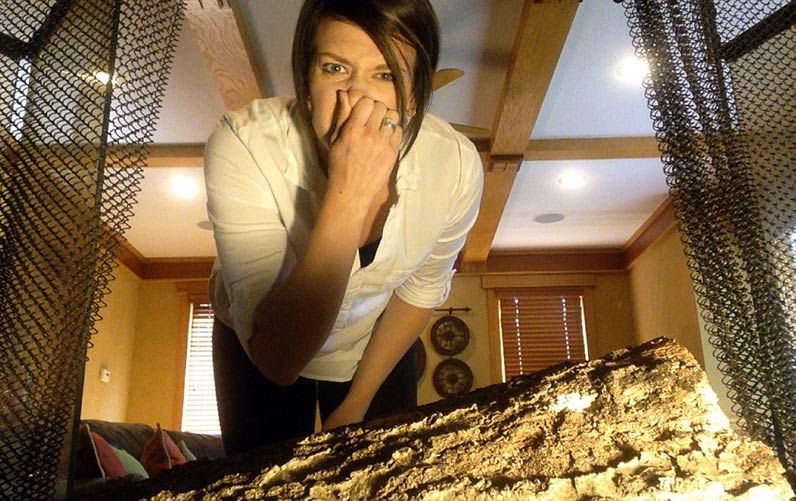Perhaps your fireplace stinks after a fire. Maybe your fireplace smells in the summer or only when it rains. Foul odor near the hearth is often a result of soot/creosote build-up, animal obstructions, moisture entering the flue, or airflow problems inside the home.
In this post, we discuss various household reasons for the stench in your fire-burning chimney system.
Reasons Why Your Fireplace Stinks Up the House
Naturally, people who burn fires in their hearth’s firebox want to enjoy the glowing ambiance and comforting aroma of firewood. However, if your house smells like smoke from the fireplace, then the process becomes a frustrating event every time you try to use it.
That’s no fun for anyone.
Believe it or not, smoking issues are not the only reason for an odor problem. Continue reading below to discover a few more reasons why your fireplace smells so bad.
- Animals, Pests, & Debris
- Soot & Creosote
- Humidity & Stale Air
- Moisture & Condensation Problems
- Backdrafts, & Poor Airflow
- Heating System Imbalance
Troubleshooting Odor: Pests, Soot, Moisture & Air
When you get a whiff of something funny, or abnormal near your fireplace, you want it gone (like yesterday) because it affects the scent of your entire home! Everyone that walks in smells THAT SMELL first! Without inspecting the unit ourselves, the biggest tip we can offer is to look at the following list and see if it registers with your situation. It could help you determine what’s causing the pungent stench by your fireside.
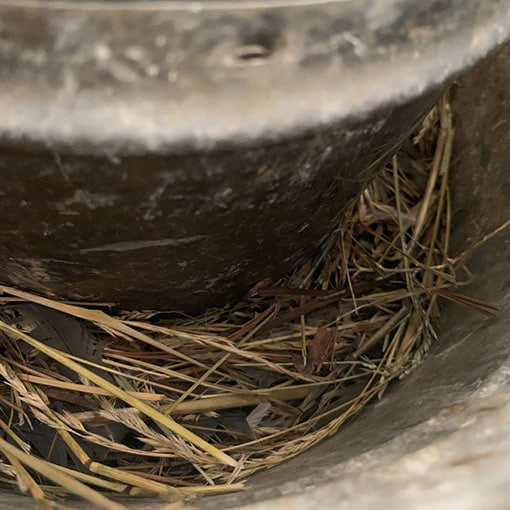
Debris can cause smells and moisture issues
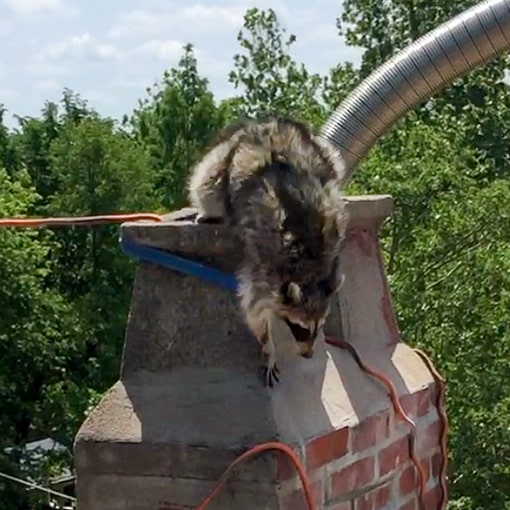
Animals can cause stinky problems
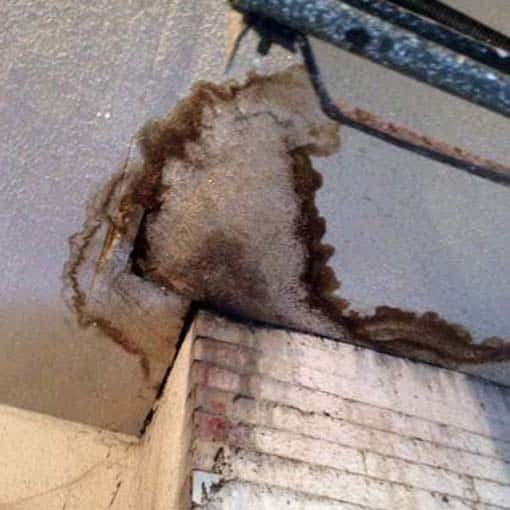
Moisture causes smelly fireplaces
Animals & Debris Cause a Stink in Your Chimney
There is never a shortage of creatures trying to invade our neighborhood chimneys. A stinky side effect of animals getting into any vents (like chimney flues) is what they leave behind. Assuming the animals make it back out alive, they didn’t take their luggage with them! Any sticks or leaves that birds, bats, or other flying pests brought in with them are now an obstruction inside your flue. Larger animals such as raccoons, squirrels, possums, cats, or small rodents like moles can get into your chimney and make a home at the bottom. Either they’ll rest on top of a closed damper, or they’ll climb down (or fall) into your firebox and make a snug little home for themselves and their babies.
They may (or may not be) stuck in your flue. Sometimes, the mother animals can get in and out to excrete waste; however, the young animals are stuck in the chimney and must use your fireplace as their bathroom.
Will a dead bird in a chimney smell?
Yes, and the same is true for any other critters trapped in your chimney flues. Eventually, you’ll get a whiff and realize you have an infestation or possibly a dead (or dying) animal.
Call your local animal control. Make sure to protect your home by installing a proper cover so it doesn’t happen again.
Sooty Creosote
You may never notice an issue during the cold winter months, but when it warms up outdoors in the summer, you start to get whiffs of fires burned last season! Now all of a sudden, the smoky scent of creosote downdrafts back into your hearth and living area. What is happening? Suppose you have clay flue tiles as your only flue liner. In that case, the creosote particles can penetrate the porous surface. No matter what you do, the smell may not disappear.
If you’ve already had a certified inspector verify you have a functioning and safe-to-use system. Still, the stench remains; this is likely the problem. In this case, we highly recommend installing a steel flue liner. The stainless steel is not porous, so your annual cleanings would be enough to keep the stink at bay!
Stale Air or Humidity Can Spell a “Campfire Smell”
Could it be that the humidity or stale air inside your home is the cause of your fireplace odor? To an extent, yes, it is safe to say that airflow inside your house does play a role in the quality of the air you breathe and whether or not the smell of ash stands out more than it did before!
For instance: Say you have all the windows and doors shut for an extended period; your A/C is not running; therefore, the air is not flowing. One consequence could be smelling a hearth you otherwise wouldn’t. If getting some decent air flowing doesn’t solve your problem, you’ll need to call a professional out to inspect the unit.
Did we mention no air movement could contribute to a condensation problem?
Moisture Can Cause a Musty Odor
A smell that is tough to describe yet easily recognizable. The musty smell of dank fireplace ash mixed with condensation causes a strange, damp, smoky smell to linger long after the fires subside. As described above, muggy heat and Humid-damp air can make anything smell worse. Still, there is an old familiar smell to chimney moisture. Caused by unrecognized condensation, the musty smell only gets worse over time. The culprit is almost always a leak. Learn more here.
Get this examined and fixed immediately to prevent breathing issues caused by mold or mildew in your home.
Video Transcript
CSIA Video: “Odor from the fireplace, and why you have a stinky chimney”
So in the winter what happens is as you
build the fire the air is drawn into the
fireplace makes its way through the
throat and up the chimney that’s because
this is hotter than the outside air when
it’s hotter outside than it is inside
it’s just the opposite of the winter
function so it’s not uncommon for air to
come down the chimney and with that
carry the odor into the house the smell
doesn’t mean that the fireplace is
improperly built or that there’s
anything particularly wrong it’s simply
a pressure issue but the scent gives it
away so what you may want to do is
experiment with opening a window and
relieving that pressure so that the air
can be static and it won’t be drawing
that odor into your home the best
solution is to call the CSI a certified
chimney sweep and have them come out and
evaluate what’s going on and they may be
able to provide you with a solution but
they can also inspect the entirety of
the chimney because we’re looking at the
whole of the structure not just the fact
that it smells bad
Household Air Flow Problems
Almost everyone is familiar with the term “backdraft,” No, we don’t mean the hit 1991 movie by Ron Howard, but rather what happens with fireplaces. Backdrafting is a big reason for malodorous or rank-smelling chimneys. It’s such a big issue that we won’t dive too deep and only briefly overview the topic below.
If you’re interested to understand this complex topic fully, please visit our two-part series that discusses the stack effect and neutral pressure plane in full detail here:
Heating System Imbalance
Something as small as opening or shutting a single door (or window) can significantly change the air pressure of homes with an imbalanced airflow. Especially in some older homes. A critical but often overlooked issue is an imbalanced heating system. An unsealed cold air return from your basement’s (poorly installed or deteriorated) ductwork could be a part of your stinky fireplace problem.
Negative air pressure downstairs could mean positive pressure upstairs. You want to make sure you have positive pressure in the upstairs.
Read more about basement problems that affect your home chimney system.
Chimney Odor Removal
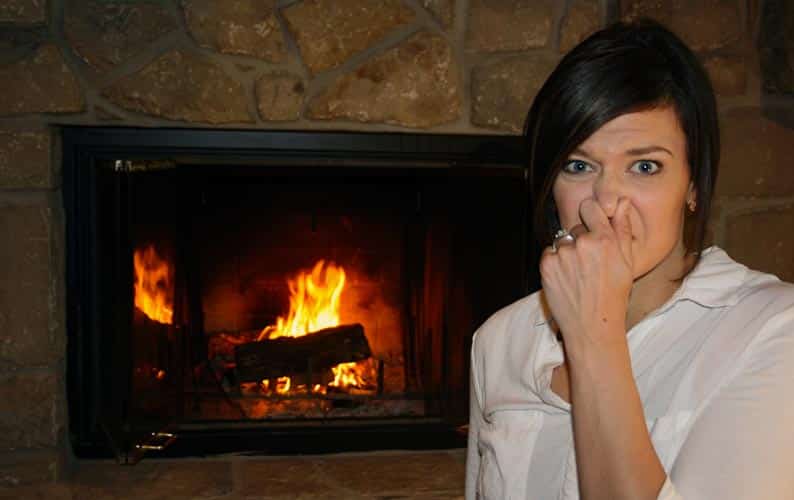
You want to know How to Get Rid of Your Fireplace Smell?
When people ask what causes their stinky chimney situation, the goal is usually just to make the smell go away! Frequently to the surprise of many, it’s not always an easy question to answer. While it is possible to neutralize your fireplace odor, it will reappear in no time until the underlying issue gets resolved.
The better question is how to prevent fireplace odor in your house in the first place?
A stinky fireplace is one of the most common signs that your chimney needs its annual cleaning in the warm months. After your flue’s been swept, it can then be adequately inspected using a high-quality video camera. The evaluation is step one toward finding a resolution to the not-so-pleasant scent of your fireplace.
Recommended Video:
If it’s not a matter of smell but actual smoke, then check out our video on priming the before lighting!
SUMMARY:
Whether your fireplace stinks when it rains or in the summer when it’s muggy outside, the odor is most commonly a consequence of one (or more) of the issues mentioned above. Such as creosote or soot building up, animal obstructions, or moisture entering the flue. If your house smells smoky it could also be something even more complex, like a backdraft or negative air pressure in your home.
Avoid the malodorous experience altogether by scheduling your annual system maintenance appointment with your local certified chimney services company.

